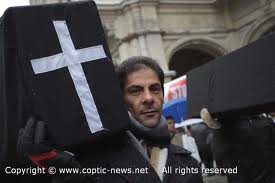 The Egyptian Initiative for Personal Rights (EIPR) today warned about the gravity of sectarian violence and incitement seen in several governorates since the massive demonstrations and marches of 30 June. The way that state agencies, particularly the security apparatus, have dealt with these attacks is disturbing. These agencies have acted slowly and have not performed their legally mandated roles, failing to intervene to protect citizens and their property despite prior knowledge of the charged atmosphere and despite their presence on the scene during attacks.
The Egyptian Initiative for Personal Rights (EIPR) today warned about the gravity of sectarian violence and incitement seen in several governorates since the massive demonstrations and marches of 30 June. The way that state agencies, particularly the security apparatus, have dealt with these attacks is disturbing. These agencies have acted slowly and have not performed their legally mandated roles, failing to intervene to protect citizens and their property despite prior knowledge of the charged atmosphere and despite their presence on the scene during attacks.
Sectarian violence in Nagaa Hassan in the Luxor governorate left four Copts dead and several homes torched and looted in the wake of the killing of a Muslim citizen. Police took no action to protect unarmed citizens although they repeatedly called on security to extract them from their homes, which were surrounded, and take them out of the village. An orthodox priest was also murdered in North Sinai, while the tense climate and incitement led churches in the area to close their doors and stop receiving worshippers.
Furthermore, some churches and Coptic-owned property came under assault starting on Wednesday evening, 3 July, following the statement by General Abd al-Fattah al-Sisi, minister of defense. Angry supporters of the deposed president, Mohamed Morsy, looted and torched a building belonging to the Catholic church in Dilga in the Minya governorate, also looting the Islah Church in the same village, terrorizing local Copts and attacking their homes. One citizen was killed and several injured in the events; other governorates saw less severe attacks.
In the same context, unknown assailants opened fire on the Mar Mina Church in the Port Said governorate, injuring two citizens. In Marsa Matrouh, angry demonstrators destroyed parts of the main door and windows of the Church of the Virgin before security forces were able to disperse them.
“Copts are paying the price of the inflammatory rhetoric against them coming from some Islamist leaders and supporters of the former president, who accuse Coptic spiritual leaders of conspiring to foment army intervention to remove Dr. Morsy. Incendiary speeches indicate that Islamist leaders believe Copts were heavily involved in the anti-Morsy protests,” said Ishak Ibrahim, EIPR officer for freedom of religion and belief. “At the same time, Copts are paying a tax to exercise their constitutional rights and take part in political life as equal citizens like any other. What is disturbing is the failure of the security apparatus to act—which at times looks like collusion—to protect citizens and their property who are being targeted on the basis of their religion.”
The EIPR is troubled by state institutions’ disregard for these incidents and their failure to deal decisively with the perpetrators and those inciting them. It is also greatly disturbed by their failure to intervene to prevent any escalation. This helps to perpetuate the attacks, especially considering that flyers were and continue to be distributed in several provinces inciting against Copts and churches.
The EIPR asked the transitional administration to take swift action to protect Egyptians and end inflammatory campaigns targeting citizens on the basis of religion. The authorities should exercise their prerogatives under the constitutional declaration issued by the interim president, Articles 4, 7 and 11 of which uphold equality before the law, freedom of belief and worship and the sanctity of private property.
The EIPR also asked the Office of the Public Prosecutor to launch investigations, carry out on-site surveys and take the statements of victims, their families and witnesses, in order to identify those responsible and prosecute them before their natural judge. The Public Prosecutor should also investigate the role of the police in these events and their failure to protect citizens and prevent further attacks, releasing its findings to the public to clarify the gravity of the situation.



